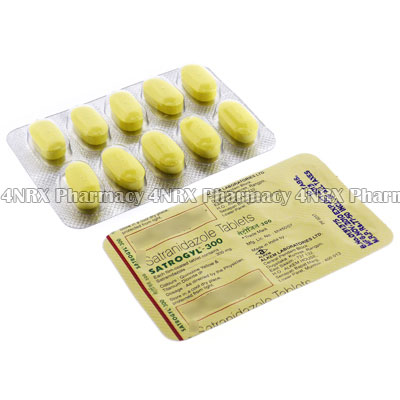 |
Home  Infection Infection  Satrogyl (Satranidazole) Satrogyl (Satranidazole) |
|
|||||||||
|
|
Satrogyl (Satranidazole)
What is Satrogyl (Satranidazole) used for? Satrogyl (Satranidazole) is an oral antibiotic used to treat protozoal infections. The medication destroys or immobilizes the organisms allowing them to be excreted out of the system. It is normally prescribed to treat trichomoniasis, periodontitis, amoebiasis, or liver abscesses. Your physician may prescribe it for other unlisted purposes, as well. How should I use Satrogyl (Satranidazole)? Satrogyl (Satranidazole) is normally taken once or twice each day at a dosage of one tablet for a cycle of medication lasting one or two weeks, but your particular instructions will depend on the condition being treated, your current health, and the severity of your symptoms. These should be swallowed with a large glass of water and may be taken with or without food. Never crush or split the tablets to avoid unintentionally destroying or altering the effects of their contents. Do not stop taking the medication before being told to do so, even if your symptoms have disappeared, as the infection may be gone and can return stronger or more resistant to treatment. What are the side effects of Satrogyl (Satranidazole)? Some patients using Satrogyl (Satranidazole) have reported experiencing side effects such as:
Immediately inform your physician about any serious or worrying symptoms you experience such as hypertension, hypotension, or signs of an allergic reaction such as swelling, hives, or difficulty breathing. These may require lower doses or reduced application frequency to prevent any further complications from occurring. Please Note Strictly follow all instructions provided to you by your physician or pharmacist while using Satrogyl (Satranidazole). Optimum and safe dosage can differ based on the patient and the condition being treated. As this medication may be unsafe for certain patients, it is essential you always inform your physician if you are pregnant or breastfeeding, as well as if you have any allergies, other illnesses, or ongoing health conditions, and if you are taking any other form of medication, supplements, or herbal products. Immediately seek emergency medical care if you have an allergic or hypersensitive reaction. Common signs of a reaction include hives, swelling, skin rashes, chest pains, as well as trouble breathing or swallowing. 

|
||||||||||||||||||||||